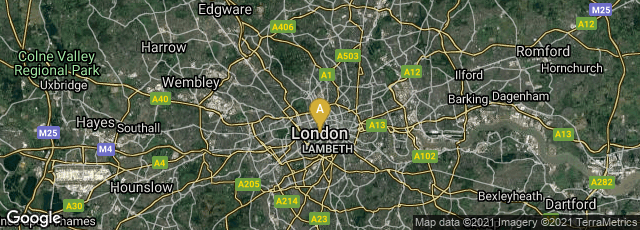

A: London, England, United Kingdom
In 1542 English physician, traveller, and writer, Andrew Boorde, published in London at the press of Robert Wyer Hereafter foloweth a compendyous regyment or a dyetary of helth: made in Mou[n]tpyllier, compyled by Andrew Boorde of physiycke doctour, dedycated to the armypotent prynce, and valyaunt Lorde Thomas Duke of Northfolche. This was the first printed book to set out rules for a healthy diet, for those who could afford to follow such a regimen.
Formerly a Carthusian monk, but by this time known as "Merry Andrew" to his friends, Boorde was "making an enviable living as a physician and purveyer of health foods in Fleet Street, London; although he had more than once been accused on scandalous behavior and loose living. He is alleged to have attributed his extreme virility and undoubted success with the ladies to a balanced diet in which oysters and figs played a prominent part. . . .
"His Dyetary of helth passed through at least four editions before the end of the sixteenth century, much of its popularity stemming from the many ingenious dietary methods he revealed by which male virility could be improved and erections prolonged. The common artichoke was his favorite recommended aphrodisiac, and must have led to a considerable run on this scarce vegetable for several seasons. Mixed with rocket seed, the effect was alleged to be dramatic. 'Eat them at dyner,' he advised his readers, 'they doth increase nature, and provoke a man to veneryous actes.'
"Unfortunately, there were an unlucky few on which this sovereign remedy for keeping one's end up did not immediately work, and Boorde devoted a whole chapter to those he designated with a compassionate eye as melancholy men,' For them the diet was strict:
'Melancholy is colde and drye; wherefore melancholy men must refrayne from fryde meate, and meate whych is ower salte. And from meate this sowre and harde of dygestyon, and from all meate whych is burnt and drye. They must abstayn from immoderate thurste, and from drynking of hot wines and grosse wine, as red wyne. And use these thyngs; cowe mylke, almond mylke, yokes of rere eggs. Boyled meate is better for melancholy men that rosted meates whych do engender good blode, and meates that whyche be temperately hote, be goode for melancholy men. And so be all herbes whyche be hotte and moyste. These thyngs followyng do purge melancoly; quycke-beam, senna sticados, harts-tongue, mayden-hair borage, oraganum [majoram] suger and whyte wyne.'
"Once having thoroughly purged melancholy, a generous helping of rocket seed and artichoke would have its usual dramatic and uplifting effect, with the one-time enforced celebate made 'merrry wyth much venery.' This was Dr. Boorde's specific for nearly all masculine ills, and one he seems to have constantly restorted to himself, to an extent that caused so much scandal in his home town of Winchester that the 'three loose women' he kept in his rooms there were 'openly punished in the greate churche and stretes of that city.'
"His Breviary of Healthe appeared in 1547; but within a month or two of its appearance Boorde was arrested and thrown unceremoniously into the Fleet Prison on charge of permitted 'boggery' in Winchester, together with an assorted array of sexual malpractices that would make headline news in the Sunday newspapers even today. Merry Andrew indignantly denied the charges, but there was no escape. He resigned himself to death and made his will on April 1, 1549. He died in Fleet soon after, probably of the 'syckness of the Prysons,' so at least he cheated the executioner. As Merry Andrew, his effigy was erected as an Aunt Sally or cock-shy by fairground stallholders for several centuries after his death, the name giving a new phrase to the English language" (Quayle, Old Cookery Books. An Illustrated History [1978] 29-31).